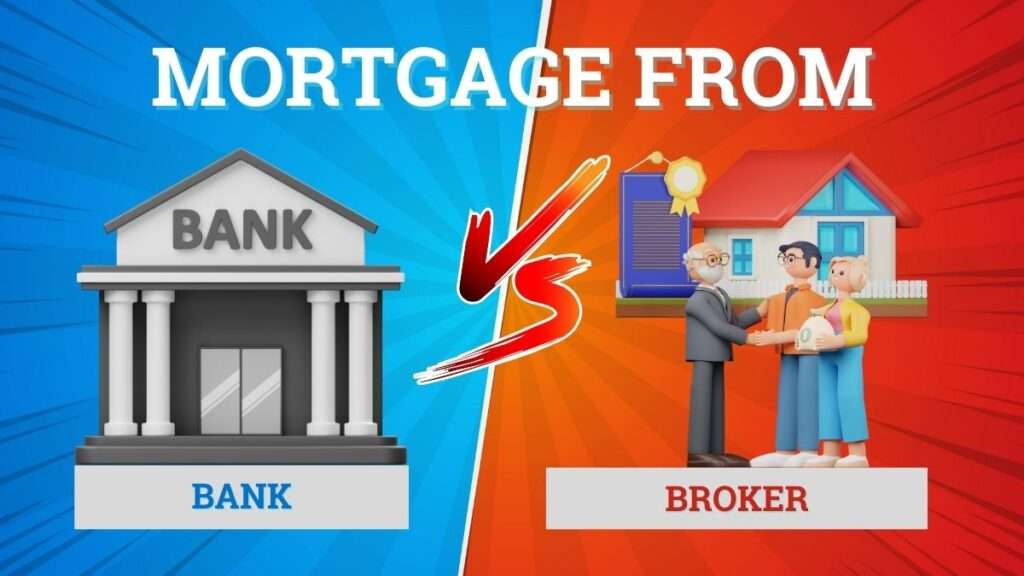Wondering whether to get your mortgage from bank vs broker? Our guide breaks down the pros and cons of each to help you find the best option for your needs.
Feeling stuck trying to decide between getting a mortgage from a bank or a broker? You’re not alone! It can feel like a big decision, but we’re here to make it easier for you. Whether you’re buying your first home, refinancing, or just exploring your options, understanding the differences between a bank and a broker can help you make the right choice.
In this post, we’ll walk you through everything you need to know—like what products are available, which offers the best rates, what fees to watch out for, and what kind of support you can expect. By the end, you’ll have a clearer idea of which path is the best fit for you. Let’s dive in!
Mortgage from Bank vs Broker
let’s find out mortgage from bank vs broker:
Product Range: Banks vs Brokers
Banks in Canada typically offer a more limited selection of mortgage products, focusing mainly on traditional fixed-rate and variable-rate options. Larger banks like RBC, TD, Scotiabank, and BMO offer competitive options for homebuyers and refinancers. While they may have specialized products, such as first-time homebuyer programs or home equity lines of credit (HELOC), they don’t offer as wide a variety as brokers.
Mortgage brokers have access to a wider variety of mortgage products, as they work with multiple lenders, including banks, credit unions, and private lenders. This means they can offer more options tailored to different financial needs, such as alternative lending products, subprime mortgages, and special programs for self-employed individuals. Brokers can often provide access to deals that aren’t available through traditional banks.
Real-World Example: John, a first-time homebuyer, approached his bank for a mortgage but found their rates were higher and they couldn’t accommodate his unconventional income as a freelancer. He then reached out to a mortgage broker who connected him with a lender that offered a specialized product for self-employed individuals with better terms.
Pro Tip: If you’re looking for a more diverse selection of mortgage options, a broker is likely your best bet, especially if you have unique needs. However, if you prefer simplicity and sticking with a traditional financial institution, a bank might be more comfortable.
Interest Rates: Banks vs Brokers
Banks usually offer competitive interest rates, but they’re often not as flexible as brokers when it comes to negotiating. Banks may offer promotional rates, but you may be limited to the products they offer. The rates can vary depending on the customer’s credit score, the term of the loan, and the down payment.
Mortgage brokers have access to rates from multiple lenders, which gives them an advantage in negotiating better deals. Brokers can often secure rates lower than what banks offer because they have more options to choose from and can shop around for you. They also have access to rates that aren’t publicly advertised.
Real-World Example: Sarah went to her bank, where they offered her a rate of 4.5%. However, after consulting a mortgage broker, she was able to secure a rate of 4.2% through a different lender. Over a 25-year mortgage term, this small difference in interest rate can lead to significant savings.
Pro Tip: Mortgage brokers tend to offer more competitive interest rates since they have access to a range of lenders and can negotiate on your behalf. However, it’s always a good idea to compare rates from both banks and brokers before making your final decision.
Fees and Charges: Banks vs Brokers
Banks typically charge application fees, appraisal fees, and sometimes administrative fees, which can add up quickly. They may also charge penalty fees for breaking your mortgage early or for missing payments. However, if you’re a customer of the bank, you might be able to negotiate lower fees or get access to exclusive deals.
Mortgage brokers generally don’t charge you directly for their services; instead, they receive a commission from the lender once the mortgage is finalized. This means that brokers can offer their expertise and guidance without charging you upfront. However, some brokers may charge a fee for special services, such as finding a non-traditional loan or helping you with a complex situation.
Real-World Example: Mike, a seasoned investor, was working with a bank and noticed fees piling up, such as higher prepayment penalties and admin fees. After switching to a broker, he found that while he didn’t have to pay any direct fees, his broker was able to find him a mortgage with fewer penalties and better terms.
Pro Tip: Banks can charge more fees, and while brokers may receive commissions from lenders, their services are typically free for the borrower. Always check for hidden fees before you make a commitment.
Service and Support: Banks vs Brokers
Banks provide 24/7 customer support, but the service can be less personalized due to the large number of clients they handle. Bank representatives typically follow a set process and may not always be able to address unique situations or answer questions in detail.
Mortgage brokers provide a more personalized experience. They take the time to understand your needs and financial goals and work closely with you throughout the mortgage process. Because brokers are independent, they can give more tailored advice and offer more flexible options.
Real-World Example: Emily had a question about her mortgage during the evening, and when she contacted her bank’s customer service, she had to wait for a long time. Later, she worked with a mortgage broker who was available at all times to answer her queries, providing a much smoother experience.
Pro Tip: If personalized service is important to you, a mortgage broker might be the better choice. Banks may be more efficient, but brokers offer more one-on-one attention.
Flexibility and Customization: Banks vs Brokers
Banks are known for their strict lending criteria, and once you’re approved, the terms of your mortgage tend to remain fixed. While you may be able to choose from a few different options in terms of mortgage length and payment frequency, banks offer less flexibility when it comes to customizing loan features.
Mortgage brokers have more flexibility because they can access a variety of lenders. They can help you customize your mortgage based on your preferences, whether it’s for prepayment flexibility, payment schedules, or even the option to switch lenders mid-term.
Real-World Example: David, a homeowner with irregular income, went to his bank for a mortgage but couldn’t get flexibility on payment dates. After switching to a broker, he was able to find a lender who allowed him to make payments whenever his income arrived, offering him the flexibility he needed.
Pro Tip: Mortgage brokers are more likely to offer customizable terms compared to banks, making them a good option if flexibility is a priority.
Mortgage from Bank vs Broker: Canada Specific
In Canada, the mortgage market is highly competitive. Canadian banks like RBC, TD, and BMO offer competitive mortgage rates but tend to have limited flexibility when compared to brokers. Brokers have access to more lenders, including credit unions, private lenders, and banks, which makes them ideal for people with specific needs.
Mortgage from Bank vs Broker Pros and Cons
Let’s have a close look at the pros and cons of mortgage from bank vs broker from the Best mortgage broker Toronto
Banks Pros
Reliability and stability.
Established customer service and support.
Offers various specialized programs like first-time homebuyer assistance.
Banks Cons
Limited product range.
Higher fees in some cases.
Less flexibility in terms of loan customization.
Mortgage Brokers Pros
Access to multiple lenders and products.
Better interest rates and terms.
More flexibility and customization.
Mortgage Brokers Cons
Less control over the final lender.
Potential for higher commissions if fees are charged.
Brokers may not have the same long-term relationship as a bank.
Mortgage from Bank vs Broker Canada
Have a look at mortgage from bank vs broker Canada:
Mortgage from Banks
Fees: Application fees, appraisal fees, prepayment penalties.
Interest Rates: Fixed or variable, but often higher than those offered by brokers.
Mortgage from Brokers
Fees: Generally no upfront fees unless a special situation arises (i.e., non-traditional loans).
Interest Rates: Often better, with access to exclusive deals and rates from a wider variety of lenders.
Future Projections for the Canadian Mortgage Market
In Canada, the mortgage broker market is expected to continue growing due to increasing demand for tailored products and the ability to shop around for better deals. As interest rates fluctuate and the demand for diverse mortgage options rises, brokers will likely capture more of the market share, especially as millennials and first-time homebuyers look for more flexibility and lower rates.
According to recent statistics, approximately 40% of Canadians are now using mortgage brokers, a significant increase from just 20% a decade ago. This trend is expected to continue, as brokers offer access to more lenders and can help clients navigate more complex financial situations.
Mortgage From Bank vs Broker Cost
Have a close look at Mortgage from bank vs broker cost:
Mortgage from a Bank
Fees: Banks may charge fees for applying, appraising, and managing your mortgage. They can also charge penalties if you pay off your mortgage early.
Interest Rates: Banks offer rates that are good, but not always the lowest.
Overall Cost: Fees can add up, and penalties can make things expensive.
Mortgage from a Broker
Fees: Brokers usually don’t charge you directly. They get paid by the lender. You might pay extra if you need special help.
Interest Rates: Brokers can find lower rates because they work with many lenders.
Overall Cost: Brokers typically cost less with lower rates and fewer fees.
Which Costs Less?
Bank: Can be more expensive with fees and higher rates.
Broker: Often cheaper with lower rates and fewer fees.
Mortgage From Bank vs Broker
Here’s the simplified comparison table with more details:
| Feature | Mortgage from Bank | Mortgage from Broker |
|---|---|---|
| Product Range | Limited options | More options, including special ones |
| Interest Rates | Competitive, but can be higher | Often lower, with better deals |
| Fees and Charges | Application, appraisal, prepayment fees | No upfront fees, commission-based |
| Service and Support | Basic support | Personalized service, tailored advice |
| Flexibility | Less flexible | More flexible options |
| Customer Focus | Focus on all homebuyers | Focus on specific needs, like bad credit or self-employed |
| Approval Process | Strict, requires more paperwork | Flexible, can handle tricky situations |
| Lender Options | Only the bank’s mortgage products | Access to many lenders |
| Turnaround Time | Can be slower due to strict rules | Faster, especially for complex cases |
| Customer Relationships | Good for existing clients | Builds personal relationships with clients |
| Access to Special Deals | Rarely offers special deals | Can find exclusive offers and deals |
| Post-Approval Support | Basic support after approval | Helps you through the entire process |
| Down Payment Flexibility | May require higher down payments | More flexible options for down payments |
| Special Circumstances | Less flexible for unique situations | Can find solutions for bad credit or self-employed people |
Important Info
Approval Process: Banks require more paperwork and have stricter rules. Brokers can be more flexible and find solutions for tricky cases.
Lender Options: Banks offer only their own products, while brokers can access many lenders, giving you more choices.
Post-Approval Support: After approval, banks give basic help, while brokers stay involved to guide you through the mortgage process.
Down Payment Flexibility: Banks often need bigger down payments, while brokers can help you find options with smaller down payments.
This simpler version should give you a clear picture of the differences between using a bank or a broker for a mortgage.
Statistics
Here are some of the statistics:
Statistics: Mortgage Brokers’ Popularity in Canada
Current Usage: 40% of Canadians now use mortgage brokers to help find home loans.
10 Years Ago: Only 20% of Canadians used mortgage brokers, showing a big increase in popularity.
Trend
The rise in mortgage brokers is because:
Personalized Help: People want advice that fits their specific financial needs.
Better Deals: Brokers can often find better rates and terms than banks.
More Complex Market: As the housing market gets more complicated, Canadians need brokers to make it easier.
Greater Awareness: More people are realizing how brokers can help them get the best deal.
This shows that more Canadians are choosing brokers for better, more personal mortgage solutions.
How AJP Mortgage Can Help?
Choosing a mortgage can feel overwhelming, but AJP Mortgage is here to make it easier. We help you find the best mortgage that fits your needs and budget. Here’s how:
Personalized Advice: We listen to your situation and help you choose the best mortgage for you.
Example: Sarah, a first-time buyer, was confused about her options. We explained everything and helped her pick a mortgage with a lower rate than the bank’s offer.
More Choices: We work with many lenders, so you get more options than just one bank. This helps you find the best deal.
Example: Mike, a self-employed worker, couldn’t get a good deal at his bank. We found him a lender who gave him a better rate.
Better Rates: We know how to get you better rates by negotiating with lenders, often getting deals not available to the public.
Example: James was offered a 4.5% rate at his bank. We helped him secure a 4.2% rate, saving him thousands over the life of the loan.
Easy Process: Mortgages can be confusing, but we break it down for you so it’s simple to understand.
Example: Emma found the mortgage process stressful. We walked her through each step and helped her pick the best option.
Save Time and Money: Searching for the best deal takes time. We save you time by comparing rates and terms, and we often help you save money with better deals.
Example: David didn’t want to call multiple banks. We found him a mortgage that was $100 cheaper per month than his bank’s offer.
Support Every Step of the Way: We’re here to help from start to finish, answering your questions and making sure you understand everything.
Example: Jane didn’t understand her mortgage agreement. We reviewed it for her and helped her avoid costly mistakes.
Help with Special Situations: If you’re self-employed, have a low credit score, or need something special, we can help you find lenders who work with these situations.
Example: Chris, a freelancer, struggled to get a mortgage with his bank. We connected him with a lender who understood his income situation and gave him a good deal.
Planning for the Future: We help you think ahead. Whether you want to refinance or buy a second property, we help you plan your next steps.
Example: Laura wanted to buy a second property. We helped her refinance her current home to get the money she needed for the new one.
Why Choose AJP Mortgage?
More Choices: We offer a wide range of options, so you can find the best deal for you.
Expert Advice: Our team explains everything in simple terms and guides you through the process.
No Hidden Costs: We’re transparent, so you won’t be surprised by hidden fees.
Ongoing Support: We’re here for the long haul, helping you throughout your mortgage journey.
Ready to Get Started?
At AJP Mortgage, we make finding the right mortgage easy. Contact us today, and we’ll help you find a mortgage that’s perfect for you!
Important Questions to Consider
As the best mortgage lenders for first-time buyers Canada here are some important questions to consider:
What’s your credit score?
If you have a low credit score, a mortgage broker may be able to connect you with a lender who is more flexible than a bank.
Do you need a specialized mortgage?
Brokers can often help with non-traditional loans, while banks offer more standardized products.
Are you looking for the lowest rates?
Mortgage brokers typically have access to better rates because of their ability to shop around.
Wrap Up: Bank vs Broker – Which Is Right for You?
Choosing between a bank and a mortgage broker really comes down to your specific needs. If you’re looking for simplicity, stability, and a familiar relationship, a bank might be the right choice for you. However, if you want more flexibility, better rates, and personalized service, a mortgage broker could be the better option.
Remember, it’s always a good idea to compare both options before making your decision. Take the time to shop around, ask questions, and look at the deals available to you from both banks and brokers. This way, you’ll have a clearer picture of which option will work best for your financial goals and long-term plans. If you are looking for the best Commercial mortgage broker near me then we are here to help you.


